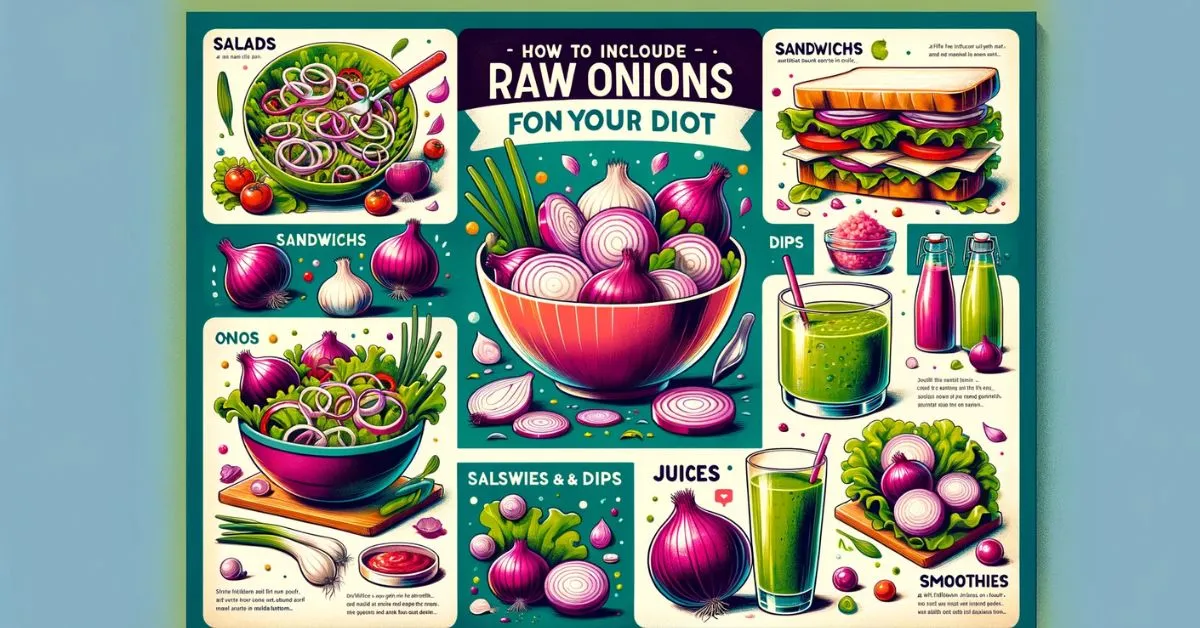Raw onions are not only a staple in culinary traditions around the world, but they also pack a powerful punch when it comes to health benefits. Rich in vitamins, minerals, and antioxidants, incorporating raw onions into your diet can lead to numerous health improvements. This article explores the nutritional content of onions, their health benefits, ways to include them in your diet, and some considerations to keep in mind.
Nutritional Content of Raw Onions
Onions are low in calories yet high in vitamins and minerals. A medium-sized onion contains a significant amount of vitamin C, which is essential for immune system function, collagen production, and tissue repair. Onions are also a good source of vitamins B6 and B9 (folate), which play key roles in metabolism, red blood cell production, and nerve function. Additionally, onions are rich in minerals such as potassium, which is crucial for heart health, and antioxidants like quercetin, which have anti-inflammatory properties.
Also read more about What Are Whole Foods? Types of Whole Foods
Health Benefits of Eating Raw Onions
1. Boosting Heart Health
The antioxidants in onions, particularly quercetin, can help reduce heart disease risk factors such as high blood pressure. A diet rich in allium vegetables like onions has been linked to improved heart health.
2. Enhancing Immune Function
Vitamin C in onions boosts the immune system, helping the body to fight off infections and diseases more effectively. Additionally, the phytochemicals in onions work as stimulants for the immune system.
3. Reducing Cancer Risk
Several studies have suggested that a higher consumption of allium vegetables, including onions, may be associated with a reduced risk of certain cancers, such as stomach and colorectal cancers. This is attributed to their rich antioxidant and anti-inflammatory properties.
Read more about Diabetic Diet: Top Strategies for Blood Sugar Control
4. Improving Digestive Health
Onions are a source of fiber and prebiotics, which are essential for maintaining a healthy gut. Prebiotics feed beneficial gut bacteria, leading to improved digestion and gut health.
5. Controlling Blood Sugar Levels
Compounds in onions, such as quercetin and sulfur, can help control blood sugar levels. This makes onions a beneficial addition to the diet for people managing diabetes or prediabetes.
How to Include Raw Onions in Your Diet

- Salads: Add thinly sliced or chopped onions to salads for a crunchy texture and a flavor boost.
- Sandwiches and Wraps: Include raw onions in sandwiches and wraps to add a kick of flavor.
- Salsas and Dips: Use onions as a key ingredient in fresh salsas and dips.
- Juices and Smoothies: For the adventurous, small amounts of onion can be added to juices or smoothies for an extra health kick.
Considerations and Precautions
While raw onions have numerous health benefits, they can also cause digestive discomfort for some people, including bloating and gas. People with irritable bowel syndrome (IBS) or a sensitivity to FODMAPs may need to limit their intake. Additionally, consuming very large amounts of raw onions could lead to heartburn or indigestion in some individuals.
Visit nexus bulletin
FAQs on Eating Raw Onions for Health
Q1: Can eating raw onions help with weight loss?
A1: Yes, raw onions can be beneficial for weight loss. They are low in calories, high in fiber, and have a high water content, which can help you feel full longer and reduce overall calorie intake.
Q2: How many raw onions should I eat a day to gain health benefits?
A2: There is no specific recommendation for the number of onions you should eat daily to gain health benefits. However, incorporating a moderate amount, such as a few slices in your salad or sandwich, can contribute to a healthy diet.
Q3: Are there any risks associated with eating raw onions?
A3: For most people, eating raw onions in moderation is safe. However, in some cases, they can cause digestive issues, such as gas, bloating, or heartburn, especially for those with sensitive stomachs or conditions like IBS. It’s recommended to start with small amounts to see how your body reacts.
Q4: Can raw onions cure or prevent any diseases?
A4: While raw onions have numerous health benefits, including potential anti-inflammatory and antioxidant effects, they are not a cure-all and should not be used as a sole treatment for any diseases. However, they can be part of a healthy diet that supports disease prevention.
Q5: Is it better to eat onions raw or cooked for health benefits?
A5: Both raw and cooked onions offer health benefits, but the profile of nutrients and compounds can change with cooking. Raw onions retain their high levels of sulfur compounds, which can be beneficial for health. Cooking can reduce some nutrients but also make others more bioavailable. Including both raw and cooked onions in your diet is beneficial.
Q6: Do different types of onions have different health benefits?
A6: Yes, different types of onions (such as red, yellow, and white onions) have varying levels of antioxidants and nutrients. Red onions, for example, are higher in antioxidants like quercetin and anthocyanins, making them slightly more beneficial for heart health and cancer prevention.
Q7: Can eating raw onions improve skin health?
A7: Yes, the vitamin C and antioxidants present in onions can contribute to improved skin health by supporting the production of collagen, protecting against UV damage, and reducing inflammation.
Q8: Are there any people who should avoid eating raw onions?
A8: Individuals with a known allergy to onions, those with IBS or severe digestive issues related to FODMAPs, and people with certain medical conditions that may be exacerbated by the consumption of raw onions should avoid them or consult with a healthcare professional.
Q9: How can I reduce the strong taste and aftertaste of raw onions?
A9: Soaking sliced onions in cold water for about 15 minutes before eating can help reduce their strong flavor and aftertaste. This can make them more palatable if you find the taste too intense.
Q10: Can eating raw onions affect oral health?
A10: While onions can contribute to bad breath and a strong aftertaste, their antibacterial properties can actually benefit oral health by reducing bacteria that can cause gum disease and cavities. Brushing teeth or chewing sugar-free gum after consuming onions can help mitigate bad breath.
Conclusion
Incorporating raw onions into your diet can offer a wealth of health benefits, from improving heart health and immune function to reducing cancer risk and supporting digestive health. With a variety of ways to include them in your meals and the potential for significant health improvements, raw onions are a simple yet powerful ingredient to boost your overall health. However, it’s important to consume them in moderation and be mindful of any digestive sensitivities.


